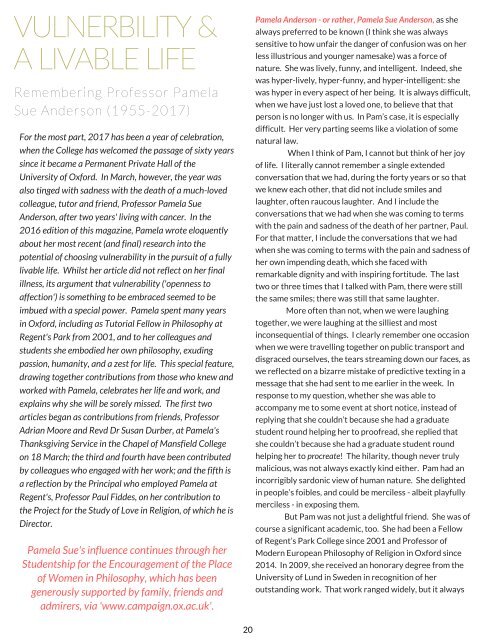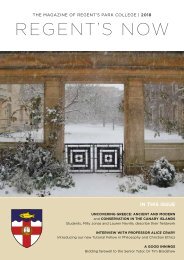RN17
You also want an ePaper? Increase the reach of your titles
YUMPU automatically turns print PDFs into web optimized ePapers that Google loves.
VULNERBILITY &<br />
A LIVABLE LIFE<br />
Remembering Professor Pamela<br />
Sue Anderson (1955-2017)<br />
For the most part, 2017 has been a year of celebration,<br />
when the College has welcomed the passage of sixty years<br />
since it became a Permanent Private Hall of the<br />
University of Oxford. In March, however, the year was<br />
also tinged with sadness with the death of a much-loved<br />
colleague, tutor and friend, Professor Pamela Sue<br />
Anderson, after two years' living with cancer. In the<br />
2016 edition of this magazine, Pamela wrote eloquently<br />
about her most recent (and final) research into the<br />
potential of choosing vulnerability in the pursuit of a fully<br />
livable life. Whilst her article did not reflect on her final<br />
illness, its argument that vulnerability ('openness to<br />
affection') is something to be embraced seemed to be<br />
imbued with a special power. Pamela spent many years<br />
in Oxford, including as Tutorial Fellow in Philosophy at<br />
Regent's Park from 2001, and to her colleagues and<br />
students she embodied her own philosophy, exuding<br />
passion, humanity, and a zest for life. This special feature,<br />
drawing together contributions from those who knew and<br />
worked with Pamela, celebrates her life and work, and<br />
explains why she will be sorely missed. The first two<br />
articles began as contributions from friends, Professor<br />
Adrian Moore and Revd Dr Susan Durber, at Pamela's<br />
Thanksgiving Service in the Chapel of Mansfield College<br />
on 18 March; the third and fourth have been contributed<br />
by colleagues who engaged with her work; and the fifth is<br />
a reflection by the Principal who employed Pamela at<br />
Regent's, Professor Paul Fiddes, on her contribution to<br />
the Project for the Study of Love in Religion, of which he is<br />
Director.<br />
Pamela Sue's influence continues through her<br />
Studentship for the Encouragement of the Place<br />
of Women in Philosophy, which has been<br />
generously supported by family, friends and<br />
admirers, via 'www.campaign.ox.ac.uk'.<br />
Pamela Anderson - or rather, Pamela Sue Anderson, as she<br />
always preferred to be known (I think she was always<br />
sensitive to how unfair the danger of confusion was on her<br />
less illustrious and younger namesake) was a force of<br />
nature. She was lively, funny, and intelligent. Indeed, she<br />
was hyper-lively, hyper-funny, and hyper-intelligent: she<br />
was hyper in every aspect of her being. It is always difficult,<br />
when we have just lost a loved one, to believe that that<br />
person is no longer with us. In Pam’s case, it is especially<br />
difficult. Her very parting seems like a violation of some<br />
natural law.<br />
When I think of Pam, I cannot but think of her joy<br />
of life. I literally cannot remember a single extended<br />
conversation that we had, during the forty years or so that<br />
we knew each other, that did not include smiles and<br />
laughter, often raucous laughter. And I include the<br />
conversations that we had when she was coming to terms<br />
with the pain and sadness of the death of her partner, Paul.<br />
For that matter, I include the conversations that we had<br />
when she was coming to terms with the pain and sadness of<br />
her own impending death, which she faced with<br />
remarkable dignity and with inspiring fortitude. The last<br />
two or three times that I talked with Pam, there were still<br />
the same smiles; there was still that same laughter.<br />
More often than not, when we were laughing<br />
together, we were laughing at the silliest and most<br />
inconsequential of things. I clearly remember one occasion<br />
when we were travelling together on public transport and<br />
disgraced ourselves, the tears streaming down our faces, as<br />
we reflected on a bizarre mistake of predictive texting in a<br />
message that she had sent to me earlier in the week. In<br />
response to my question, whether she was able to<br />
accompany me to some event at short notice, instead of<br />
replying that she couldn’t because she had a graduate<br />
student round helping her to proofread, she replied that<br />
she couldn’t because she had a graduate student round<br />
helping her to procreate! The hilarity, though never truly<br />
malicious, was not always exactly kind either. Pam had an<br />
incorrigibly sardonic view of human nature. She delighted<br />
in people’s foibles, and could be merciless - albeit playfully<br />
merciless - in exposing them.<br />
But Pam was not just a delightful friend. She was of<br />
course a significant academic, too. She had been a Fellow<br />
of Regent’s Park College since 2001 and Professor of<br />
Modern European Philosophy of Religion in Oxford since<br />
2014. In 2009, she received an honorary degree from the<br />
University of Lund in Sweden in recognition of her<br />
outstanding work. That work ranged widely, but it always<br />
20





